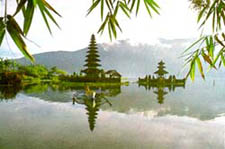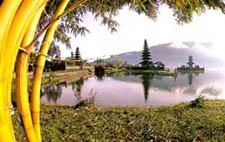
Bedugul / Ulundanu Temple
|
|
To reach
the mountain
range, you drive west from Denpasar through Mengwi. As you leave the
southern plains, the landscape changes from flowing tiers of rice to
motley patches of onion, cabbage and papaya grown in the cool climate
of the highlands.
|
|
The
clusters of
farmhouses along the way are no longer the familiar thatched huts of
the south, but sturdy cottages made of wood and tile to withstand the
steady downpour of heavy rains. This is rich alpine country. The earth,
saturated by mountain streams, is smothered with thick moss and
creepers. The road climbs and winds its way around steep cliffs hung
with ferns, wild flowers and elephant grass.
|
|
In jungle
terrain lies
the serene lake of Bratan, veiled with mist. It fills the ancient
crater of Mt. Bratan. Because the lake is an essential water source for
surrounding farmlands, the people of Bedugul honor Dewl'tanu, goddess
of the waters, in the temple UluDanu on a small promontory on the lake.
|

|
|
One can
stay overnight
nearby at a rest house on the shore. It is peaceful and cool. Children
fish for minnows and canoes cross the still waters, carrying firewood
to villages on the further bank. Just near Bedugul is the market of
Bukit Mungsu selling wild orchids and both temperate and tropical
vegetables grown in the fertile soil here. Near the market are the
botanical gardens.
|

|
Lake
Bratan is so lovely
that it is easy to forget the surrounding forest-clad mountains. From
the market a path leads through pine plantations up towards the primary
jungle on the peaks. An old Dutch forestry house and the remains of a
once extensive garden lie mysteriously within the forest.
|
|
There is a
small temple
high up, its walls carved with superb reliefs. On the road north of
Bedugui, past the new international-standard golf course, the road
rises along the lip of Lake Buyan, affording a clear view of the Bratan
basin.
|
Copyright
2001-2015, K&D Bali Designs. All rights reserved.
|